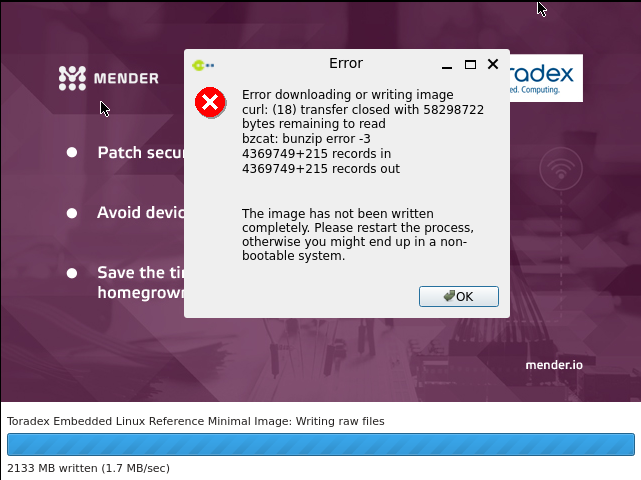I am flashing via unattended Ethernet (local nginx server connected via ethernet, serving as tezi.toradex.com). I have not tried to flash via USB stick, but I intend to.
My image.json file is:
{
"config_format": 2,
"autoinstall": true,
"name": "Toradex Embedded Linux Reference Minimal Image",
"description": "Minimal image without graphical interface that just boots",
"version": "Mender dunfell",
"release_date": "2021-07-16",
"prepare_script": "prepare.sh",
"wrapup_script": "wrapup.sh",
"marketing": "mender-tezi-metadata/marketing_mender_toradex.tar",
"icon": "mender-tezi-metadata/mender_toradex_linux.png",
"supported_product_ids": [
"0037",
"0047",
"0048",
"0049"
],
"blockdevs": [
{
"name": "mmcblk0",
"table_type": "gpt",
"content": {
"rawfiles": [
{
"filename": "Reference-Minimal-Image-apalis-imx8.sdimg.bz2"
}
]
}
},
{
"name": "mmcblk0boot0",
"erase": true,
"content": {
"filesystem_type": "raw",
"rawfiles": [
{
"filename": "imx-boot",
"dd_options": "seek=0"
}
]
}
}
]
}
In the good case, where the image is written correctly and boots without error, the sdimg file looks like (fdisk -u -l):
Disk /var/www/html/apalis-imx8/Apalis-iMX8_Reference-Minimal-Image.sdimg: 1016 MiB, 1065353216 bytes, 2080768 sectors
Units: sectors of 1 * 512 = 512 bytes
Sector size (logical/physical): 512 bytes / 512 bytes
I/O size (minimum/optimal): 512 bytes / 512 bytes
Disklabel type: dos
Disk identifier: 0x684a9a61
Device Boot Start End Sectors Size Id Type
/var/www/html/apalis-imx8/Apalis-iMX8_Reference-Minimal-Image.sdimg1 * 49152 114687 65536 32M c W95 FAT32 (LBA)
/var/www/html/apalis-imx8/Apalis-iMX8_Reference-Minimal-Image.sdimg2 114688 966655 851968 416M 83 Linux
/var/www/html/apalis-imx8/Apalis-iMX8_Reference-Minimal-Image.sdimg3 966656 1818623 851968 416M 83 Linux
/var/www/html/apalis-imx8/Apalis-iMX8_Reference-Minimal-Image.sdimg4 1818624 2080767 262144 128M 83 Linux
In the error case, where the image is not written successfully, the sdimg file is (fdisk -u -l):
Disk /var/www/html/apalis-imx8/Apalis-iMX8_Reference-Minimal-Image.sdimg: 3,102 GiB, 4286578688 bytes, 8372224 sectors
Units: sectors of 1 * 512 = 512 bytes
Sector size (logical/physical): 512 bytes / 512 bytes
I/O size (minimum/optimal): 512 bytes / 512 bytes
Disklabel type: dos
Disk identifier: 0xdc70cdbd
Device Boot Start End Sectors Size Id Type
/var/www/html/apalis-imx8/Apalis-iMX8_Reference-Minimal-Image.sdimg1 * 49152 114687 65536 32M c W95 FAT32 (LBA)
/var/www/html/apalis-imx8/Apalis-iMX8_Reference-Minimal-Image.sdimg2 114688 4112383 3997696 1,9G 83 Linux
/var/www/html/apalis-imx8/Apalis-iMX8_Reference-Minimal-Image.sdimg3 4112384 8110079 3997696 1,9G 83 Linux
/var/www/html/apalis-imx8/Apalis-iMX8_Reference-Minimal-Image.sdimg4 8110080 8372223 262144 128M 83 Linux
In this case I get the error popup from tezi shown below.

